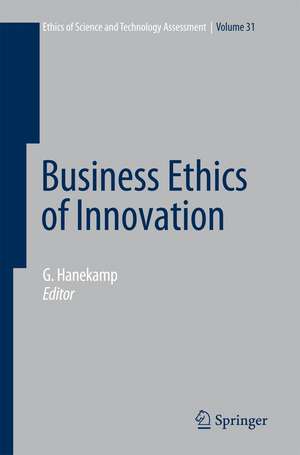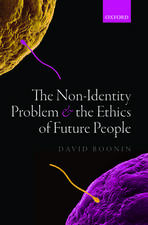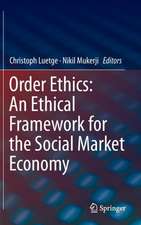Business Ethics of Innovation: Ethics of Science and Technology Assessment, cartea 31
Editat de Gerd Hanekampen Limba Engleză Hardback – 15 mai 2007
| Toate formatele și edițiile | Preț | Express |
|---|---|---|
| Paperback (1) | 477.89 lei 43-57 zile | |
| Springer Berlin, Heidelberg – 25 noi 2010 | 477.89 lei 43-57 zile | |
| Hardback (1) | 384.86 lei 43-57 zile | |
| Springer Berlin, Heidelberg – 15 mai 2007 | 384.86 lei 43-57 zile |
Din seria Ethics of Science and Technology Assessment
- 15%
 Preț: 439.70 lei
Preț: 439.70 lei - 18%
 Preț: 796.13 lei
Preț: 796.13 lei -
 Preț: 392.21 lei
Preț: 392.21 lei -
 Preț: 350.12 lei
Preț: 350.12 lei - 5%
 Preț: 368.00 lei
Preț: 368.00 lei - 20%
 Preț: 709.13 lei
Preț: 709.13 lei -
 Preț: 386.22 lei
Preț: 386.22 lei - 15%
 Preț: 714.02 lei
Preț: 714.02 lei -
 Preț: 478.05 lei
Preț: 478.05 lei -
 Preț: 489.30 lei
Preț: 489.30 lei -
 Preț: 389.70 lei
Preț: 389.70 lei - 15%
 Preț: 469.91 lei
Preț: 469.91 lei - 15%
 Preț: 643.00 lei
Preț: 643.00 lei -
 Preț: 402.98 lei
Preț: 402.98 lei -
 Preț: 393.90 lei
Preț: 393.90 lei -
 Preț: 407.19 lei
Preț: 407.19 lei -
 Preț: 384.86 lei
Preț: 384.86 lei -
 Preț: 386.61 lei
Preț: 386.61 lei -
 Preț: 402.38 lei
Preț: 402.38 lei - 15%
 Preț: 657.73 lei
Preț: 657.73 lei - 18%
 Preț: 747.20 lei
Preț: 747.20 lei - 5%
 Preț: 737.69 lei
Preț: 737.69 lei - 15%
 Preț: 449.83 lei
Preț: 449.83 lei - 15%
 Preț: 504.99 lei
Preț: 504.99 lei - 5%
 Preț: 366.70 lei
Preț: 366.70 lei - 5%
 Preț: 724.50 lei
Preț: 724.50 lei - 18%
 Preț: 740.11 lei
Preț: 740.11 lei - 15%
 Preț: 473.49 lei
Preț: 473.49 lei -
 Preț: 405.06 lei
Preț: 405.06 lei
Preț: 384.86 lei
Nou
Puncte Express: 577
Preț estimativ în valută:
73.67€ • 80.04$ • 61.92£
73.67€ • 80.04$ • 61.92£
Carte tipărită la comandă
Livrare economică 21 aprilie-05 mai
Preluare comenzi: 021 569.72.76
Specificații
ISBN-13: 9783540723097
ISBN-10: 3540723099
Pagini: 130
Ilustrații: XV, 112 p.
Dimensiuni: 155 x 235 x 10 mm
Greutate: 0.34 kg
Ediția:2007
Editura: Springer Berlin, Heidelberg
Colecția Springer
Seria Ethics of Science and Technology Assessment
Locul publicării:Berlin, Heidelberg, Germany
ISBN-10: 3540723099
Pagini: 130
Ilustrații: XV, 112 p.
Dimensiuni: 155 x 235 x 10 mm
Greutate: 0.34 kg
Ediția:2007
Editura: Springer Berlin, Heidelberg
Colecția Springer
Seria Ethics of Science and Technology Assessment
Locul publicării:Berlin, Heidelberg, Germany
Public țintă
ResearchCuprins
Business Ethics of Innovation. An Introduction.- Corporate Ethics and Globalization — Global Rules and Private Actors.- Research Priorities, Profits, and Public Goods: The Case of Drug Resistant Disease.- Ethical Issues Associated with Pharmaceutical Innovation.- Corporate Responsibility for Innovation — A Citizenship Framework.- Access to Medicines and the Innovation Dilemma — Can Pharmaceutical Multinationals be Good Corporate Citizens?.- IT Innovations and Open Source: A Question of Business Ethics or Business Model?.
Notă biografică
Andrew Crane, born 1968, is Professor of Business Ethics and Director of the MBA in CSR at Nottingham University Business School. He is interested in various aspects of business ethics, including the role of morality in marketing and consumption; the contribution of evolutionary narratives to environmental management; the implementation of fair trade policies; and the contribution of Foucauldian thought to business ethics. Recent work appeared in Academy of Management Review, Journal of Business Research, Organization Studies, Journal of Business Ethics and Business Ethics Quarterly. He holds a BSc from Warwick University and a PhD in Business Studies from Nottingham University. From January 2007, he will hold the George R. Gardiner Chair in Business Ethics at the Schulich School of Business, York University, Toronto. Email andrew.crane@nottingham.ac.uk
Margaret L. Eaton, Pharm.D., J.D.
Lecturer in Management, Graduate School of Business, Stanford University (Faculty Affiliate: Center for Social Innovation). Past positions: Stanford Center for Biomedical Ethics, Stanford University Office of the General Counsel, and Lecturer, Stanford University School of Medicine. Studied law at University of California at San Francisco. Studied pharmaceutics at Union University and Duquesne University and served as Associate Professor, University of Minnesota School of Pharmacy.
Hanekamp, Gerd, Dr. phil. Dipl.-Chem., studied chemistry at Heidelberg and Marburg and at the École Nationale de Chimie in Lille; 1996: Doctorate in philosophy at the University of Marburg; from 1996 – 2003 junior/senior scientist, from 2003 – 2005 deputy director, Europäische Akademie Bad Neuenahr-Ahrweiler GmbH, presently on leave for a position at the Office of the Science Council; fields of research: applied ethics, philosophy of science, theory of the social sciences, technology assessment,. e-mail: hanekamp@wissenschaftsrat.de
Dirk Matten, born 1965, is Professor of Business Ethics and Director of the Centre for Research into Sustainability at Royal Holloway, University of London. He is interested in international aspects of ethics and CSR, recent work appeared in Academy of Management Review, Journal of Management Studies, Organization Studies, Journal of Business Ethics and Business Ethics Quarterly. His first degree in business is from the University of Essen (Dipl.-Kfm.) and his PhD and Habilitation from Heinrich-Heine-University Düsseldorf. From January 2007, he will hold the Hewlett-Packard Chair in CSR at the Schulich School of Business, York University, Toronto. Email dirk.matten@rhul.ac.uk
Jeremy Moon, born 1955, is Professor of Corporate Social Responsibility and Director of the International Centre for Corporate Social Responsibility (ICCSR) at Nottingham University Business School. His previous appointments include Chair of the Political Science Department at the University of Western Australia. He held a number of visiting positions at universities around the globe, including Princeton, McGill, and Cambridge, and was a Jean Monnet Research Fellow at the European University Institute in Florence. He holds a BA and a PhD in Political Science from Exeter University. Jeremy has published widely in the areas of Government and CSR; CSR in Europe; CSR and Globalisation and Conceptualising and Theorising CSR. Email jeremy.moon@nottingham.ac.uk
Nüttgens, Markus, Prof. Dr., born 1963, studied Business Administration at the University of Saarland 1984-1989 (Dipl.Kfm.) and 1995 (Dr. rer. oek.). 1989-2001 Scientific Assistant at Institut of Information Systems (IWi), 2001-2003 Deputy Professor of Information Systems at the University Trier, since 2004 Full Professor of Information Systems at the University Hamburg. Main interests: Information Systems Management, Information- andBusiness Process Management, Business Standard Software, Open Source / Access, IT-Entrepreneurship. Address: Von-Melle-Park 9, D-20146 Hamburg; e-mail: markus.nuettgens@wiso.uni-hamburg.de
Seiter, Andreas, Dr.med, born 1955, studied medicine at Friedrich-Alexander-University in Erlangen, Germany 1974-1980; intern in aneasthesiology and internal medicine at Gunzenhausen hospital 1982-84; 1984 - 2003 various management positions in medical operations, marketing and external relations at Sandoz AG in Germany and Switzerland, later merged with Ciba to Novartis AG; 2004 - 2006 Pharmaceutical Fellow at the World Bank; since May 2006 Senior Health Specialist, Pharmaceuticals, The World Bank, 1818 H Street NW, Washington DC 20433, e-mail aseiter@worldbank.org
Michael J. Selgelid received a BSEng in Biomedical Engineering at Duke University and an MA and PhD in Philosophy at the University of California, San Diego. His doctoral dissertation examined ethical issues associated with eugenics. He previously worked as a Postdoctoral Research Fellow and Lecturer, respectively, in the Division of Bioethics and Philosophy Department at the University of the Witwatersrand in Johannesburg, South Africa; and as Sesquicentenary Lecturer in Bioethics in the Unit for History and Philosophy of Science and the Centre for Values, Ethics and the Law in Medicine (VELIM) at the University of Sydney. He is currently a Senior Research Fellow at the Centre for Applied Philosophy and Public Ethics (CAPPE) and the Menzies Centre for Health Policy at The Australian National University in Canberra. His research over the past five years has focused on the history of and ethical issues associated with infectious disease. He recently completed co-editing a book titled Ethics and Infectious Disease (Blackwell, 2006).
Steinmann, Horst, Prof. em. Dr. Dres. h .c., born 1934, studied Business Administration at the University of Göttingen 1954-1959 (Dipl.Kfm.) and at the Institut Européen d'Administration des Affaires (INSEAD), Fontainebleau, 1964/65 (MBA). 1962 Dr. rer. nat. and 1967 Habilitation (TU Clausthal). 1968 -1970 Full Professor of Operations Research at the FU Berlin; 1970-1999 Full Professor of Business Administration and General Management at the University of Erlangen-Nürnberg. Doctor honoris causa University of Bern (1996) and University Robert Schuman Strassbourg (1999). Founder of the German Business Ethics Network (1993). Main interests: General Management, Business Ethics, Corporate Governance, Philosophy of Science. Address: Hubertusstraße 8, D-90491 Nürnberg; e-mail: horst.steinmann@wiso.uni- erlangen.de
Margaret L. Eaton, Pharm.D., J.D.
Lecturer in Management, Graduate School of Business, Stanford University (Faculty Affiliate: Center for Social Innovation). Past positions: Stanford Center for Biomedical Ethics, Stanford University Office of the General Counsel, and Lecturer, Stanford University School of Medicine. Studied law at University of California at San Francisco. Studied pharmaceutics at Union University and Duquesne University and served as Associate Professor, University of Minnesota School of Pharmacy.
Hanekamp, Gerd, Dr. phil. Dipl.-Chem., studied chemistry at Heidelberg and Marburg and at the École Nationale de Chimie in Lille; 1996: Doctorate in philosophy at the University of Marburg; from 1996 – 2003 junior/senior scientist, from 2003 – 2005 deputy director, Europäische Akademie Bad Neuenahr-Ahrweiler GmbH, presently on leave for a position at the Office of the Science Council; fields of research: applied ethics, philosophy of science, theory of the social sciences, technology assessment,. e-mail: hanekamp@wissenschaftsrat.de
Dirk Matten, born 1965, is Professor of Business Ethics and Director of the Centre for Research into Sustainability at Royal Holloway, University of London. He is interested in international aspects of ethics and CSR, recent work appeared in Academy of Management Review, Journal of Management Studies, Organization Studies, Journal of Business Ethics and Business Ethics Quarterly. His first degree in business is from the University of Essen (Dipl.-Kfm.) and his PhD and Habilitation from Heinrich-Heine-University Düsseldorf. From January 2007, he will hold the Hewlett-Packard Chair in CSR at the Schulich School of Business, York University, Toronto. Email dirk.matten@rhul.ac.uk
Jeremy Moon, born 1955, is Professor of Corporate Social Responsibility and Director of the International Centre for Corporate Social Responsibility (ICCSR) at Nottingham University Business School. His previous appointments include Chair of the Political Science Department at the University of Western Australia. He held a number of visiting positions at universities around the globe, including Princeton, McGill, and Cambridge, and was a Jean Monnet Research Fellow at the European University Institute in Florence. He holds a BA and a PhD in Political Science from Exeter University. Jeremy has published widely in the areas of Government and CSR; CSR in Europe; CSR and Globalisation and Conceptualising and Theorising CSR. Email jeremy.moon@nottingham.ac.uk
Nüttgens, Markus, Prof. Dr., born 1963, studied Business Administration at the University of Saarland 1984-1989 (Dipl.Kfm.) and 1995 (Dr. rer. oek.). 1989-2001 Scientific Assistant at Institut of Information Systems (IWi), 2001-2003 Deputy Professor of Information Systems at the University Trier, since 2004 Full Professor of Information Systems at the University Hamburg. Main interests: Information Systems Management, Information- andBusiness Process Management, Business Standard Software, Open Source / Access, IT-Entrepreneurship. Address: Von-Melle-Park 9, D-20146 Hamburg; e-mail: markus.nuettgens@wiso.uni-hamburg.de
Seiter, Andreas, Dr.med, born 1955, studied medicine at Friedrich-Alexander-University in Erlangen, Germany 1974-1980; intern in aneasthesiology and internal medicine at Gunzenhausen hospital 1982-84; 1984 - 2003 various management positions in medical operations, marketing and external relations at Sandoz AG in Germany and Switzerland, later merged with Ciba to Novartis AG; 2004 - 2006 Pharmaceutical Fellow at the World Bank; since May 2006 Senior Health Specialist, Pharmaceuticals, The World Bank, 1818 H Street NW, Washington DC 20433, e-mail aseiter@worldbank.org
Michael J. Selgelid received a BSEng in Biomedical Engineering at Duke University and an MA and PhD in Philosophy at the University of California, San Diego. His doctoral dissertation examined ethical issues associated with eugenics. He previously worked as a Postdoctoral Research Fellow and Lecturer, respectively, in the Division of Bioethics and Philosophy Department at the University of the Witwatersrand in Johannesburg, South Africa; and as Sesquicentenary Lecturer in Bioethics in the Unit for History and Philosophy of Science and the Centre for Values, Ethics and the Law in Medicine (VELIM) at the University of Sydney. He is currently a Senior Research Fellow at the Centre for Applied Philosophy and Public Ethics (CAPPE) and the Menzies Centre for Health Policy at The Australian National University in Canberra. His research over the past five years has focused on the history of and ethical issues associated with infectious disease. He recently completed co-editing a book titled Ethics and Infectious Disease (Blackwell, 2006).
Steinmann, Horst, Prof. em. Dr. Dres. h .c., born 1934, studied Business Administration at the University of Göttingen 1954-1959 (Dipl.Kfm.) and at the Institut Européen d'Administration des Affaires (INSEAD), Fontainebleau, 1964/65 (MBA). 1962 Dr. rer. nat. and 1967 Habilitation (TU Clausthal). 1968 -1970 Full Professor of Operations Research at the FU Berlin; 1970-1999 Full Professor of Business Administration and General Management at the University of Erlangen-Nürnberg. Doctor honoris causa University of Bern (1996) and University Robert Schuman Strassbourg (1999). Founder of the German Business Ethics Network (1993). Main interests: General Management, Business Ethics, Corporate Governance, Philosophy of Science. Address: Hubertusstraße 8, D-90491 Nürnberg; e-mail: horst.steinmann@wiso.uni- erlangen.de
Textul de pe ultima copertă
Firms that operate in a market economy often depend upon innovations in order to achieve competitive advantages that sustainably secure their survival. Business ethics is thus largely concerned with questions about the decisional freedoms involved in innovation processes.
Innovations oftentimes raise novel questions about the role of the state or the structure of society. Business ethics needs to provide a framework for balancing the different perspectives, values, and interests at stake. This balance must be achieved at the level of the firm in order to facilitate adequate long term decisions, but it should also be sought at higher, including regulatory, levels. Achieving this balance will require an ethical framework for entrepreneurial action.
The particular disciplines engaged in generating innovations as well as all relevant fields of applied ethics should be involved in the balancing process. Business Ethics of Innovation is thus necessarily an interdisciplinary endeavour.
This volume assesses general questions of how business ethics can help to structure innovations and specifically discusses pharmaceutical innovations as well as innovations in the IT sector.
Innovations oftentimes raise novel questions about the role of the state or the structure of society. Business ethics needs to provide a framework for balancing the different perspectives, values, and interests at stake. This balance must be achieved at the level of the firm in order to facilitate adequate long term decisions, but it should also be sought at higher, including regulatory, levels. Achieving this balance will require an ethical framework for entrepreneurial action.
The particular disciplines engaged in generating innovations as well as all relevant fields of applied ethics should be involved in the balancing process. Business Ethics of Innovation is thus necessarily an interdisciplinary endeavour.
This volume assesses general questions of how business ethics can help to structure innovations and specifically discusses pharmaceutical innovations as well as innovations in the IT sector.
Caracteristici
Includes supplementary material: sn.pub/extras




















